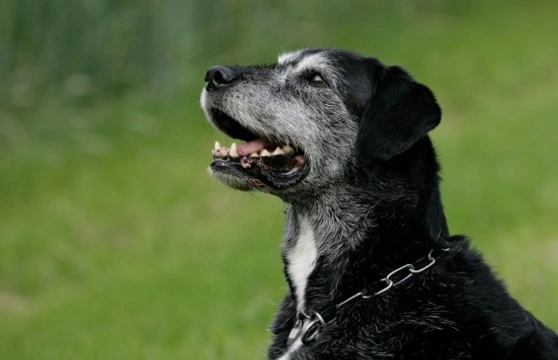
Behavioural problems and cognitive dysfunction in older dogs
Pet owners generally think of behavioural problems in dogs as being something that occurs in young animals that are still in the process of being trained, rather than something that older dogs are likely to develop later in life. This being the case, many dog owners are often shocked to realise that mature dogs can also sometimes be prone to developing behavioural issues unexpectedly as well, which can cause problems in identifying the root cause of the problem and knowing what to do about it. Many problems that manifest as behavioural issues and disobedience in older dogs actually have their roots in underlying health issues, or the general decline that accompanies old age. It is of course important to get to the bottom of any behavioural changes in your older dog in order to identify whether it is actually a behavioural issue after all, or something that requires physical treatment.
Identifying if a behavioural problem is age related
It can be hard to define exactly what the cause of any change or problem that arises in your dog is, and also sometimes difficult to identify when the problem actually begun to develop. If your dog is aged over eight years old (or seven for giant breeds) then they are classed as ‘mature,’ and you should be aware of the fact that their physical and mental functions will gradually begin to decline over the coming years as a natural side effect of reaching old age. If your mature dog begins acting out or behaving differently, it is important to get your vet to run some tests to rule out any underlying physical health issues that may be affecting their behaviour, before you automatically rule the issue at hand as a behavioural problem in its own right. Blood tests, urinalysis and sometimes even scans and x-rays may be required to gather a complete picture of your older dog’s health, and the sooner these can be performed, the better.
Some potential age-related behavioural issues to be on the lookout for
The most common behavioural issues that accompany aging in dogs are:
- Inappropriate urination or defecation in the house
- Increased urination or defecation
- Unwillingness to exercise
- Going off their food or becoming picky about food
- Grouchiness and even aggression
- Restlessness
- Becoming clingy and unwilling to be left alone
- Compulsive behaviours such as excessive licking or scratching
- Unwillingness to follow commands
- Excessive barking or howling
These are just some of the behavioural issues that can accompany aging in dogs, and may all be indicative of an underlying health issue or medical cause.
Cognitive dysfunction in dogs
While any of the signs and symptoms described above may have an easily identifiable cause such as kidney or liver problems or other underlying physical issues, they can also be symptomatic of cognitive dysfunction. Cognitive dysfunction is a condition that the vast majority of older dogs will manifest to some extent as they approach the end of their life; particularly if they live to a ripe old age. The term ‘cognitive dysfunction’ refers to the natural decline of a dog’s memory, alertness, concentration and ability to learn and retain new information and commands. Cognitive dysfunction has been likened to dementia and Alzheimer’s disease in people, and has a similar effect on the dog’s behaviour and mental ability.
Tackling cognitive dysfunction in dogs
The good news is that in many cases, cognitive dysfunction can successfully be managed and medicated in order to minimise its effects on the dogs and owners affected by it, and to allow your dog to enjoy their old age in good health and good spirits for much longer than if the condition was left to run its course naturally.Dietary supplements and changes to the diet alone are sometimes enough to help to support brain function and promote normal behaviours in dogs during the early stages of the condition, and reviewing your dog’s diet as they age is very important, whether they are showing any symptoms of cognitive dysfunction and associated behavioural issues or not.Various medications may also be prescribed to promote healthy brain function and help to counteract the onset of mental decline in old age, including:
- Propentofylline, which helps to promote blood flow to the brain, protect the nervous system and maintain cellular function.
- Selegiline, which helps to protect nerve cells against degeneration and normalise the brain’s dopamine levels. It is particularly effective at tackling emotional issues that lead to acting out in older dogs.
- Nicerogoline, to protect the brain cells from further decline, boost the oxygen levels in the blood and address issues that often accompany canine senility, such as inappropriate toileting.
A combination of nutritional changes and medication is often recommended to help to address age-related behavioural changes in dogs, and can help to restore your dog’s previous good temperament, understanding of training commands, learned behaviour and lust for life. However, once behavioural changes have begun to manifest in your older dog, it is important to understand that they may require re-training alongside of their new treatment regime to ensure that they are clear on what is expected of them after learning or unlearning training or appropriate behaviour.You must also be prepared to accommodate for the fact that as your dog gets older and particularly if they live to a very old age, you will have to make allowances for some of the natural changes that they will go through in terms of their behaviour and health. Taking care of your dog and being empathic about the issues that they are facing as part of what is, after all, the perfectly natural process of aging and general decline in their later years, is of course very important.



